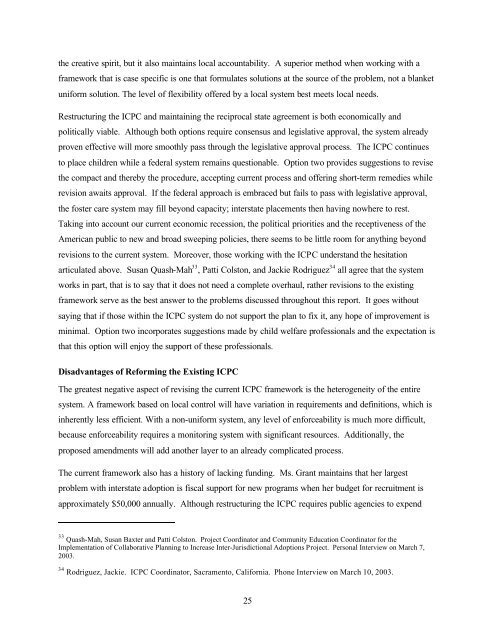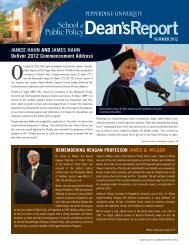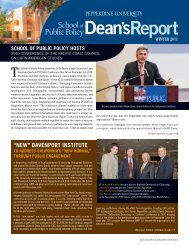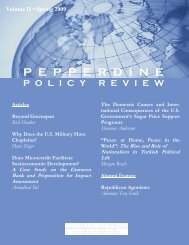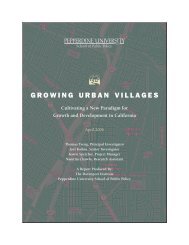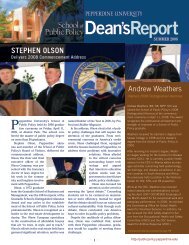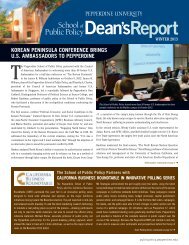Finding Permanent Homes for Adoptable Children - Pepperdine ...
Finding Permanent Homes for Adoptable Children - Pepperdine ...
Finding Permanent Homes for Adoptable Children - Pepperdine ...
Create successful ePaper yourself
Turn your PDF publications into a flip-book with our unique Google optimized e-Paper software.
the creative spirit, but it also maintains local accountability. A superior method when working with a<br />
framework that is case specific is one that <strong>for</strong>mulates solutions at the source of the problem, not a blanket<br />
uni<strong>for</strong>m solution. The level of flexibility offered by a local system best meets local needs.<br />
Restructuring the ICPC and maintaining the reciprocal state agreement is both economically and<br />
politically viable. Although both options require consensus and legislative approval, the system already<br />
proven effective will more smoothly pass through the legislative approval process. The ICPC continues<br />
to place children while a federal system remains questionable. Option two provides suggestions to revise<br />
the compact and thereby the procedure, accepting current process and offering short-term remedies while<br />
revision awaits approval. If the federal approach is embraced but fails to pass with legislative approval,<br />
the foster care system may fill beyond capacity; interstate placements then having nowhere to rest.<br />
Taking into account our current economic recession, the political priorities and the receptiveness of the<br />
American public to new and broad sweeping policies, there seems to be little room <strong>for</strong> anything beyond<br />
revisions to the current system. Moreover, those working with the ICPC understand the hesitation<br />
articulated above. Susan Quash-Mah 33 , Patti Colston, and Jackie Rodriguez 34 all agree that the system<br />
works in part, that is to say that it does not need a complete overhaul, rather revisions to the existing<br />
framework serve as the best answer to the problems discussed throughout this report. It goes without<br />
saying that if those within the ICPC system do not support the plan to fix it, any hope of improvement is<br />
minimal. Option two incorporates suggestions made by child welfare professionals and the expectation is<br />
that this option will enjoy the support of these professionals.<br />
Disadvantages of Re<strong>for</strong>ming the Existing ICPC<br />
The greatest negative aspect of revising the current ICPC framework is the heterogeneity of the entire<br />
system. A framework based on local control will have variation in requirements and definitions, which is<br />
inherently less efficient. With a non-uni<strong>for</strong>m system, any level of en<strong>for</strong>ceability is much more difficult,<br />
because en<strong>for</strong>ceability requires a monitoring system with significant resources. Additionally, the<br />
proposed amendments will add another layer to an already complicated process.<br />
The current framework also has a history of lacking funding. Ms. Grant maintains that her largest<br />
problem with interstate adoption is fiscal support <strong>for</strong> new programs when her budget <strong>for</strong> recruitment is<br />
approximately $50,000 annually. Although restructuring the ICPC requires public agencies to expend<br />
33 Quash-Mah, Susan Baxter and Patti Colston. Project Coordinator and Community Education Coordinator <strong>for</strong> the<br />
Implementation of Collaborative Planning to Increase Inter-Jurisdictional Adoptions Project. Personal Interview on March 7,<br />
2003.<br />
34 Rodriguez, Jackie. ICPC Coordinator, Sacramento, Cali<strong>for</strong>nia. Phone Interview on March 10, 2003.<br />
25


